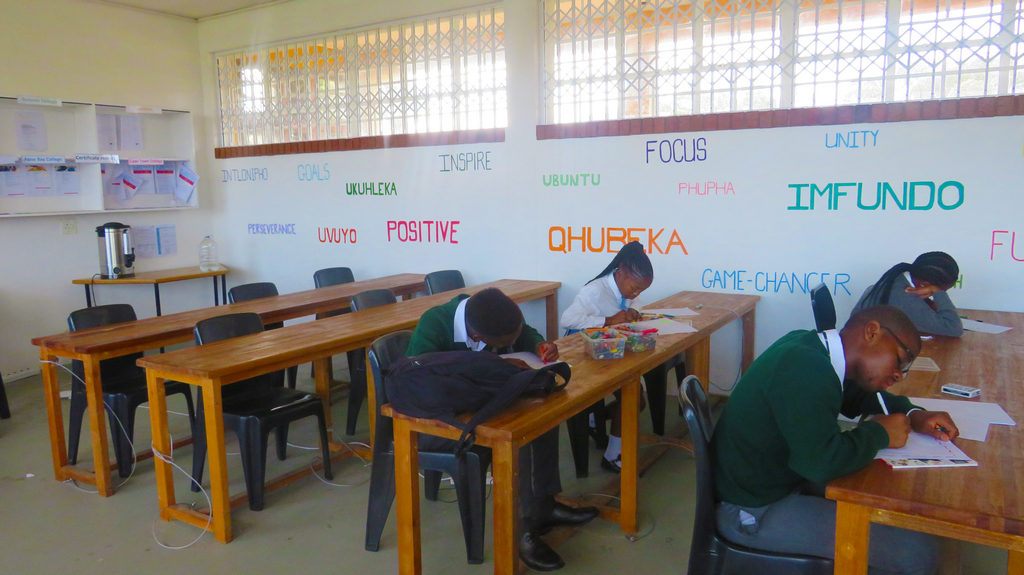The Learning Trust celebrates its 10th anniversary supporting emerging community-based After School programmes and 2020 will certainly be remembered as one of the most challenging during our tenure.
More importantly, this has been one of the most severely challenging times for the vast majority of learners in South Africa.
We partner with close to 40 community-based educational non-profit organisations across Gauteng, the Western and Eastern Cape Provinces.
Through the provision of funding and capacity support to the After School sector, the team and its partners work to improve educational outcomes of young people living in poverty and exclusion.
Research shows that after school programmes can measurably improve learner success in school and help to prevent dropping out, which is unacceptably high in quintile 1, 2 and 3 schools.
These after school programmes include tutoring and homework, e-learning, skills-building, sport, and arts & culture.
Equal access to resources
With hard lockdown gradually easing in South Africa, there is an urgency to get physical schools operational again.
However, the majority, classified according to the poverty ranking system as quintile 1, 2 and 3, face immense challenges such as overcrowded classrooms and lack of water and basic sanitation.
Furthermore, teachers and learners have not had any educational continuity without tech and data to support distance learning.
Despite the trimmed curriculum these learners face a monumental backlog under stressed and unsafe conditions, going back to school.
By contrast the minority of well-resourced South African schools (quintiles 4 and 5) have been able to apply COVID-19 safety protocols with ease, picking up seamlessly from where they were just days ago online.
Digital Divide
The digital divide in South Africa has deepened the fault lines in our society and left our more vulnerable children even farther behind.
“Digital solutions have had little to no impact in the communities where we operate. Other ways to support learners and include them in catch-up are vital.
“We also have the incredible task of shaping a post-pandemic world where these children can equally access the resources they need to learn and succeed in our country,” says Sibongile Khumalo, Executive Director of The Learning Trust.
Partner organisations have taken practical measures to address immediate educational needs such as playing roles in monitoring sanitation at schools, as well as reaching out to learners who are still at home due to the phased return to school.
The Learning Trust added a ‘Lockdown Learning Pack’ portal to its website, a list of academic-curricular content shared by the DBE.
We also introduced the ‘COVID-19 ASP Treasure Box,’ a compilation of After School programme resources for all learners, available in multilingual format for downloading and printing.
“Every investment now in improved education opportunities for a child in an under-served community is a step towards a better future for all South Africans,” concludes Khumalo.
Mobilising community efforts
It is vital during these challenging times that there is full and ongoing support for educational NGOs as they work to leave no child behind during the Covid-19 pandemic.
“There is a great need to focus on boosting community-based efforts to implement both proven strategies, like after school programmes, and new innovations that help under-served schools not just meet the Department of Basic Education’s current mandate but improve post-pandemic outcomes for vulnerable learners,’ says Khumalo.
She adds, “Organisations such as our After School Programme (ASP) partners are well-established in their communities.
“They are highly valuable reservoirs of local knowledge, expertise and relationships within school communities that can now be mobilised for collaborative and meaningful action.”
Supporting the education department with post-COVID-19 recovery
TLT partner organisations are currently mobilised in their communities to help school sanitation issues, provide extra-lessons and extra space for schools for social distancing.
Many are providing learners who are still at home with learning materials.
They also provide psycho-social support to teachers and learners.
Our partner organisations are active in engaging with schools directly to help them meet specific needs that are easily overlooked in government planning.
Looking to the immediate future, incubation camps for academic support are planned, while small-scale after school programmes with social distancing are ready to be resumed.
In conclusion Sibongile Khumalo says,
“We are interrogating and exploring how our post-COVID world could be much better for the school communities and learners who have always had the odds stacked against them.
“While we realise that extended learning cannot replace schooling, we believe that the After-school community can make a significant contribution to government efforts.
“We therefore plan to continue funding organisations so that they are able to sustain themselves.
“The pandemic has forced change upon the world, but there are ways we can solve systemic problems and truly improve education in South Africa.”
